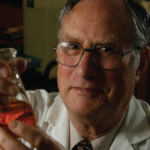Dr. Scofield recalls many late afternoon sessions “planning and discussing our science. He set the tone that the program should be collegial and interactive.” Enjoyment of each other’s company was also part of the recipe. Dr. Harley recalls annual chili cook-offs every February in honor of Dr. Reichlin’s birthday, and during holiday gatherings at the Reichlin home, Drs. Scofield and Reichlin were known to perform on their trumpets (see photo at right). “I’m a social character,” says Dr. Reichlin. “I like to interact with people, and I feel that organizational skills are important in moving a field forward. So it came naturally and easily to me.”
Legacy of Generosity
“There wasn’t anyone who had more influence on my career than he did,” Dr. Targoff now says of his long-term association with Dr. Reichlin. After residency, he joined Dr. Reichlin’s research program in Buffalo. Then, when it was time to establish his own lab, Dr. Reichlin “made that transition very easy for me. He was also a good role model for academic medicine.” Currently, Dr. Targoff is an assistant member with the Arthritis and Clinical Immunology Research Program and professor of medicine at OHSC, and a staff physician with the Oklahoma City Veterans Affairs Medical Center.
Yasuhiko Itoh, MD, PhD, of the department of pediatrics at Nippon Medical School in Tokyo, did his postdoctoral work in rheumatology at OMRF from 1988 to 1991. “As a supervisor, Dr. Reichlin was incredibly patient and very good at praising young people. During my first month in the lab, I repeatedly failed Western blots. When I finally succeeded, he told me, ‘You are the King of Gel!’ ” Exposure to Dr. Reichlin’s autoantibody discoveries and research values have continued to influence Dr. Itoh’s own work, as he continues to try, he says, to “solve patients’ symptoms as scientifically as possible.”
Dr. Scofield notes, “Moe was always really generous with everybody, always wanting to collaborate and to nurture the next generation.” That trend has continued. In 2007, Yehuda Shoenfeld, MD, head of the Zabludowicz Center for Autoimmune Diseases in the Sheba Medical Center and Tel-Aviv University, Israel, whose laboratory is well known for experimental models of induced autoimmune disease, was interested in investigating the psychiatric manifestations of lupus. He contacted Dr. Reichlin, who immediately agreed to send purified anti-P ribosomal antibodies for the experiments, which involved injection of the autoantibodies directly to the brain to bypass the blood–brain barrier. The mice developed depression. In follow-up investigations, Dr. Reichlin helped to identify the limbic system as associated with both depression and sense of smell.6 Thus, Dr. Reichlin’s generosity and inquisitiveness “were instrumental in identifying the autoimmune mechanism responsible for psychiatric manifestations, and led to the new field that we later developed about smell and the autoimmune diseases,” says Dr. Shoenfeld.7


